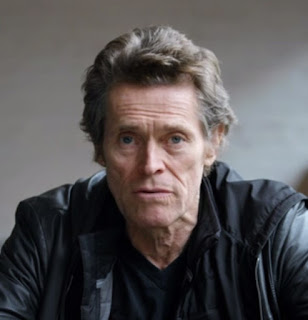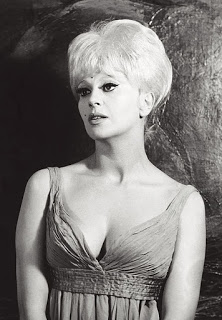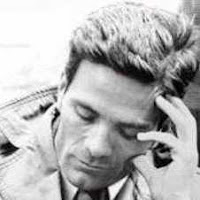Controversial figure who met violent death
 |
Pier Paolo Pasolini courted controversy in his films,
his private life and his politics |
The novelist, writer and film director Pier Paolo Pasolini was born on this day in 1922 in Bologna.
Pasolini's best-known work included his portrayal of Jesus Christ in The Gospel According to St. Matthew (1964), his bawdy adaptations of such literary classics as Boccaccio’s Decameron (1971) and Chaucer’s The Canterbury Tales (1972), and and his brutal satire on Fascism entitled Salò, or the 120 Days of Sodom (1975).
He also wrote novels and poetry, made documentaries, directed for the theatre and was an outspoken columnist for the Milan newspaper
Corriere della Sera, expressing political views that would regularly spark heated debate.
A former member of the
Communist Party and openly homosexual, Pasolini died in violent circumstances in
Ostia, near Rome, in November 1975, supposedly murdered by a young man he had picked up at the city’s Termini railway station, although there was some mystery around the incident and speculation over motives continues to this day.
The son of an army lieutenant, Pasolini lived in various northern Italian towns in his childhood, determined by his father’s postings. Family life was somewhat turbulent. His father spent time in prison over gambling debts but was also the man who detained
Anteo Zamboni, a teenager suspected of attempting to assassinate Mussolini in 1926.
 |
The house where Pasolini was born in Bologna - now an
office of the Guardia di Finanzia, is marked with a plaque |
Pasolini graduated from the
University of Bologna and began to pursue an interest in writing poetry that he had nurtured since the age of seven, inspired by the beauty of
Casarsa della Delizia, a town in Friuli and the home of his mother’s family. He published his first volume of poetry in 1942.
He attributed his mostly Marxist politics to his experience of the oppressed peasant communities around Casarsa. His 19-year-old brother
Guido, a member of the anti-Fascist Partito d’Azione, was accidentally killed in by partisans in an ambush.
After 1945, Pasolini worked as a secondary school teacher in nearby Valvasone but his activities as a Communist Party member made him a controversial figure and he was eventually forced out of his job by the local
Christian Democrats, whom he accused of manufacturing a scandal that saw him charged with the "corruption of minors and (committing) obscene acts in public places".
In January 1950, Pasolini moved to
Rome with his mother Susanna to start a new life. He was later acquitted of both charges. They moved to the run-down suburb of
Rebibbia, next to a prison, which provided the inspiration for his first novels, which dealt with the violent lives of poor proletarian immigrants living in often horrendous sanitary and social conditions, and his debut movie,
Accattone (1961).
 |
Pasolini taking part in a radio broadcast
in Rome in 1975 |
Prior to that he had worked variously as a teacher in
Ciampino and a writer for Italian state radio before making the acquaintance of the director
Federico Fellini, who employed him to help with the Roman dialect in both
Le notti di Cabiria and
La Dolce Vita.
Pasolini was prepared to tackle controversial subjects.
Mamma Roma (1962), featuring
Anna Magnani, which told the story of a prostitute and her son, was considered an affront to morality and widely criticised.
The Gospel According to St Matthew (1964), which won awards at both the Venice Film Festival and BAFTA, also attracted criticism, portraying Christ as a revolutionary ‘Red Messiah’, but Pasolini vowed to direct it from the "believer's point of view" and the Catholic Church has since described it as “the best film ever made about Jesus Christ.”
He attracted criticism for different reasons with his sex-laden
Decameron (1971),
The Canterbury Tales (1972), and
Il fiore delle mille e una notte (literally
The Flower of 1001 Nights, released in English as
Arabian Nights, 1974), his
Trilogy of Life, which celebrated the human body while commenting on contemporary sexual and religious mores and hypocrisies. They were hugely popular,
Decameron and
The Canterbury Tales winning awards at the Berlin Film Festival, although Pasolini later regretted his association with them, because the many softcore imitations of the films made him uncomfortable about their success.
His final work,
Salò or the 120 Days of Sodom (1975), exceeded what most viewers could accept at the time in its explicit scenes of intensely sadistic violence. A satire on Fascism - Salò being the name of the Fascist ‘republic’ Mussolini set up in northern Italy in a desperate attempt to cling to power - it is based on the novel
120 Days of Sodom by
Marquis de Sade, and is considered Pasolini's most controversial film.
 |
Willem Dafoe starred as Pasolini in the 2014
film about his life directed by Abel Ferrara |
Despite evidence that more than one person was involved, only
Giuseppe (Pino) Pelosi, the young man he supposedly picked up, was convicted of his murder. Pelosi was caught after police stopped him as he sped from the scene in Pasolini’s Alfa Romeo.
The autopsy indicated that the director had been run over by the car on the beach as Ostia, having first been severely beaten with blunt instruments. Pelosi confessed his guilt, claiming he attacked the director after refusing to be subjected to a particularly violent sexual act.
The verdict of the 1976 court hearing was that Pelosi “and unknown others” were guilty of the crime, although the “unknown others” did not appear in the wording when that verdict went to appeal.
Speculation about alternative motives began almost immediately and intensified when, 29 years later, Pelosi retracted his confession. He said he had made it under the threat of violence to his family and claimed that the crime had been committed by three people regularly seen at the Tiburtina branch of the neo-fascist party
Movimento Sociale Italiano (Italian Social Movement).
The conspiracy theorists discussed extortion following the theft of a number of reels of film from Salò as one explanation, while others suspected a political motive.
 |
Franca Rame, who married the playwright
Dario Fo and became a political activist |
In his columns in the
Corriere della Sera, long before the
Tangentopoli enquiry led to the collapse of Italy’s then deeply-corrupt political establishment, Pasolini said that the leadership of the ruling Christian Democratic party should stand trial, not only for corruption and links with the Mafia, but for association with neo-fascist terrorism, such as the bombing of trains and a demonstration in Milan.
Also, at the time of his death, Pasolini was working on a novel,
Petrolio, that was clearly based on the mysterious death of
Enrico Mattei, the former president of the state oil company ENI, which suggested that the scandal went to the heart of power via the involvement of the illegal masonic lodge
Propaganda Due.
Attacks on left-wing activists were relatively common in the 1970s. For example,
Franca Rame, the actress wife of the playwright
Dario Fo and a prominent member of the Italian Communist Party, was kidnapped and raped by a group of neo-Fascists in 1973.
However, though the Pasolini case was reopened in 2005, no new conclusions were reached.
In 2014 the director
Abel Ferrara made a biopic about Pasolini, with Willem Dafoe in the lead role, which was selected to compete for the Golden Lion at the 71st Venice International Film Festival.
 |
The ruins of the Roman city of Ostia Antica are better
preserved than Pompei yet are much less well known |
Travel tip:
The seaside resort of
Ostia, where Pasolini’s life ended so tragically, lies 30km (19 miles) to the southwest of Rome, situated just across the Tiber river from Fiumicino, home of Rome’s largest international airport. It adjoins the remains of the ancient Roman city of Ostia Antica, a much-better preserved site than volcano-ravaged Pompei occupying around 10,000 square metres, radiating from a mile-long main street. There are many houses and apartment blocks, plus warehouses and public buildings, and an impressive amphitheatre.. Many Romans spend their summer holidays in the modern town, swelling a population of about 85,000.
Hotels in Ostia Antica by Booking.com
 |
The church of Santa Croce and San Rocco, where the
funeral for Pier Paolo Pasolina took place in 1975 |
Travel tip:
Casarsa della Delizia is a town in the Friuli-Venezia Giulia region, about 40km (25 miles) west of Udine and about 18km (11 miles) from Pordenone. It is today an important agricultural centre, particularly for wine production, and an important rail hub. Until the end of the Cold War saw numbers reduced, it hosted a large number of Italian military personnel. Pasolini’s funeral took place in the parish church of Santa Croce and San Rocco, before his body was buried in the municipal emetery. The church of Santa Croce and San Rocci contains a cycle of 16th century frescoes by Pomponio Amalteo or by Pordenone.
















